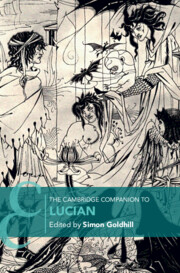Book contents
- Frontmatter
- Contents
- List of Figures and Tables
- List of Contributors
- 1 Introduction
- Part I
- Part II
- 8 In Praise of the Fly
- 9 Lucian’s Phalaris
- 10 Lucian the Doorkeeper: Inside and Outside in Lucianic Poetics
- 11 Geographical Authority and Bodily Entanglement in Lucian’s True Histories
- 12 Menippus Goes to the Moon: Fantastical Astronomy and Lucian’s Scientific Imagination
- 13 Lucian and Christianity
- 14 Identification and Distance in Lucian’s Dialogues of the Courtesans: Subjects and Their Absences
- 15 ‘Here’s Looking at You … ’: The Dialogues of the Gods and the Erotics of the Visual
- Part III
- References
- Index Locorum
- Subject Index
- Cambridge Companions to Literature
10 - Lucian the Doorkeeper: Inside and Outside in Lucianic Poetics
from Part II
Published online by Cambridge University Press: 07 November 2024
- Frontmatter
- Contents
- List of Figures and Tables
- List of Contributors
- 1 Introduction
- Part I
- Part II
- 8 In Praise of the Fly
- 9 Lucian’s Phalaris
- 10 Lucian the Doorkeeper: Inside and Outside in Lucianic Poetics
- 11 Geographical Authority and Bodily Entanglement in Lucian’s True Histories
- 12 Menippus Goes to the Moon: Fantastical Astronomy and Lucian’s Scientific Imagination
- 13 Lucian and Christianity
- 14 Identification and Distance in Lucian’s Dialogues of the Courtesans: Subjects and Their Absences
- 15 ‘Here’s Looking at You … ’: The Dialogues of the Gods and the Erotics of the Visual
- Part III
- References
- Index Locorum
- Subject Index
- Cambridge Companions to Literature
Summary
As every reader of Lucian knows, he always belongs to something without belonging to it wholly. His relationship to his own Greek identity is undoubtedly the most symbolic instance: although wholly mastering the Greek language, he emphasises his being a barbarian. Lucian’s foreignness is a typical mark of his protean authorial persona throughout his œuvre, producing a constant tension between an inside and an outside as Lucian emphasises his own paradoxical liminality. This chapter discusses six of his texts (True Histories, Scythian, The Hall, On Salaried Posts, Symposium, and Lexiphanes), suggesting that a movement towards the inside and then the outside marks Lucian’s textuality in disparate ways. Depending on the specific narrative context, this movement assumes different meanings (autobiographical, metaphorical, metapoetical, rhetorical) that are often combined with each other, but most importantly produces a fundamental tension between meaning itself and the absence of significance.
- Type
- Chapter
- Information
- The Cambridge Companion to Lucian , pp. 202 - 223Publisher: Cambridge University PressPrint publication year: 2024

